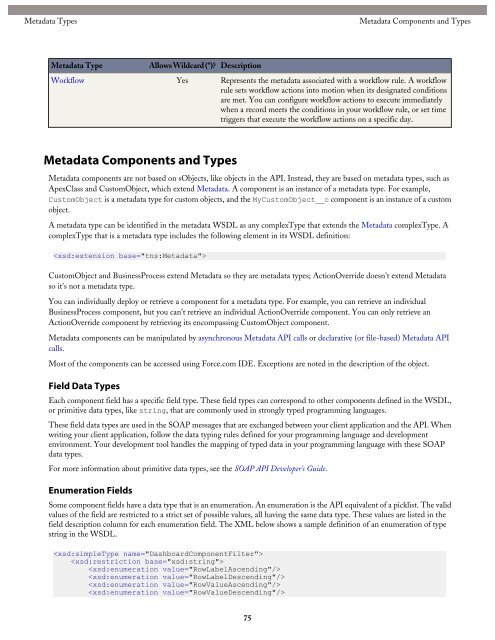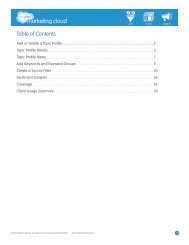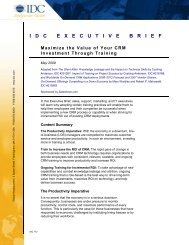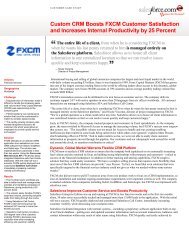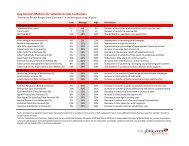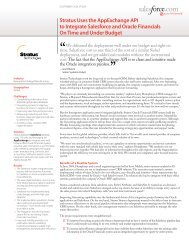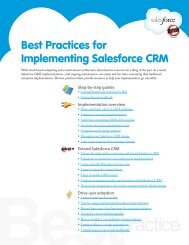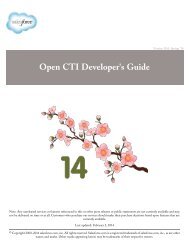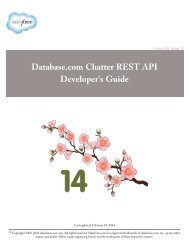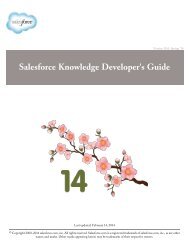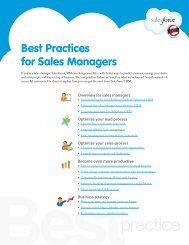Database.com Metadata API Developer's Guide - Salesforce.com
Database.com Metadata API Developer's Guide - Salesforce.com
Database.com Metadata API Developer's Guide - Salesforce.com
You also want an ePaper? Increase the reach of your titles
YUMPU automatically turns print PDFs into web optimized ePapers that Google loves.
<strong>Metadata</strong> Types<strong>Metadata</strong> Components and Types<strong>Metadata</strong> TypeWorkflowAllows Wildcard (*)? DescriptionYesRepresents the metadata associated with a workflow rule. A workflowrule sets workflow actions into motion when its designated conditionsare met. You can configure workflow actions to execute immediatelywhen a record meets the conditions in your workflow rule, or set timetriggers that execute the workflow actions on a specific day.<strong>Metadata</strong> Components and Types<strong>Metadata</strong> <strong>com</strong>ponents are not based on sObjects, like objects in the <strong>API</strong>. Instead, they are based on metadata types, such asApexClass and CustomObject, which extend <strong>Metadata</strong>. A <strong>com</strong>ponent is an instance of a metadata type. For example,CustomObject is a metadata type for custom objects, and the MyCustomObject__c <strong>com</strong>ponent is an instance of a customobject.A metadata type can be identified in the metadata WSDL as any <strong>com</strong>plexType that extends the <strong>Metadata</strong> <strong>com</strong>plexType. A<strong>com</strong>plexType that is a metadata type includes the following element in its WSDL definition:CustomObject and BusinessProcess extend <strong>Metadata</strong> so they are metadata types; ActionOverride doesn't extend <strong>Metadata</strong>so it's not a metadata type.You can individually deploy or retrieve a <strong>com</strong>ponent for a metadata type. For example, you can retrieve an individualBusinessProcess <strong>com</strong>ponent, but you can't retrieve an individual ActionOverride <strong>com</strong>ponent. You can only retrieve anActionOverride <strong>com</strong>ponent by retrieving its en<strong>com</strong>passing CustomObject <strong>com</strong>ponent.<strong>Metadata</strong> <strong>com</strong>ponents can be manipulated by asynchronous <strong>Metadata</strong> <strong>API</strong> calls or declarative (or file-based) <strong>Metadata</strong> <strong>API</strong>calls.Most of the <strong>com</strong>ponents can be accessed using Force.<strong>com</strong> IDE. Exceptions are noted in the description of the object.Field Data TypesEach <strong>com</strong>ponent field has a specific field type. These field types can correspond to other <strong>com</strong>ponents defined in the WSDL,or primitive data types, like string, that are <strong>com</strong>monly used in strongly typed programming languages.These field data types are used in the SOAP messages that are exchanged between your client application and the <strong>API</strong>. Whenwriting your client application, follow the data typing rules defined for your programming language and developmentenvironment. Your development tool handles the mapping of typed data in your programming language with these SOAPdata types.For more information about primitive data types, see the SOAP <strong>API</strong> <strong>Developer's</strong> <strong>Guide</strong>.Enumeration FieldsSome <strong>com</strong>ponent fields have a data type that is an enumeration. An enumeration is the <strong>API</strong> equivalent of a picklist. The validvalues of the field are restricted to a strict set of possible values, all having the same data type. These values are listed in thefield description column for each enumeration field. The XML below shows a sample definition of an enumeration of typestring in the WSDL.75


